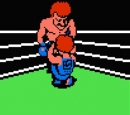SAN FRANCISCO — Nintendo’s Wii console might not sell as well this year as it did in 2009, executive vice president Cammie Dunaway said Thursday.
Speaking to Wired.com during the company’s media summit at the W hotel in San Francisco, Dunaway said that at this point in the lifecycle of Nintendo’s home console, sales might not continue to climb. “It’s natural that at this point in the lifecycle, going in to our fifth year, that we’re probably not going to sell as many units next year as we sold this year. That’s the course of a cyclical business. But that’s not to say that we can’t continue to sell a lot of units for a long period of time,” she said.
As of January 2010, the NPD Group said that Nintendo had sold 27.6 million Wii consoles in the U.S, 9.6 million of which were sold in 2009. Wii launched in November 2006.
The rest of our interview touched on the other things that Nintendo said (or were conspicuously reticent about) at the summit, from the Nintendo DSi XL to The Legend of Zelda on Wii to the company’s localization plans for Japanese games like Xenoblade. An edited Q&A is below.
Wired.com: Originally, I don’t know if Nintendo knew what the audience was going to be for the DSi XL — the colors were wine red, cigar brown, so it was oriented towards adults. But it seems a lot of kids are buying it because the screens are big.
Cammie Dunaway: That’s exactly what’s happened. As we launch here in the U.S., that’s why we’re taking a three-pronged approach: We’ve got America’s Test Kitchen launching with it, which is great for showing off the social nature. We also have Wario Ware: D.I.Y. launching at the same time, and Pokémon, all in the same two weeks. We’re not trying to target it at any one particular group.
Wired.com: You’ve announced major games for the first half of the year. Do you see the game industry moving toward a more year-long release schedule, in general?
Dunaway: One of the things that’s true for Nintendo is that we’re not driven by a calendar for our release dates. When the games are ready to go, when the quality is perfect, that’s when we release. We all benefit if we can keep a pretty steady pace, so the development teams have worked hard to make sure that we’ve got a full lineup this year. If you compare the first half of 2010 with the first half of 2009, it’s night and day. And from some of the things that Mr. Iwata has talked about, and that we will talk about at E3, like Zelda, you know that we’re going to have a good back half of the year, as well.
Wired.com: I think people were really interested to know, are they going to release Mario and Metroid and Zelda all in one year?
Dunaway: And you said we wouldn’t. You bet no, right?
Wired.com: I bet no. Are you going to hold me to that? Do I owe you a steak dinner?
Dunaway: I think you do.
Wired.com: I’m happy to lose that bet. Those are the kind of bets that I try to make.
Dunaway: So were you surprised to see the dates for Mario Galaxy and Metroid?
Wired.com: After the Australian leaks, no. But I am excited to play Mario Galaxy 2 in three months. I do have to keep drilling you, though, about some of the games that are out in Japan.
Dunaway: Of course you do.
Wired.com: Of course! Explain to me Nintendo’s philosophy on localizing games. Because it seems very clear to me that while most other videogame publishers make sure that most of the stuff that they publish comes out in other territories, sometimes even Nintendo games that come out in Europe don’t make it to America, like the Wii version of Trace Memory. It seems that Nintendo of America has a very restrictive approach and cherry-picks games.
Dunaway: The way it works is that Nintendo of America and Nintendo of Europe have teams who are responsible for going over to Japan three or four times a year, looking at what’s going on with the development teams, and making decisions about what makes sense to bring to the U.S. and when it makes sense to bring it here. I would argue that they are bringing a lot of great Japanese property here — I know you and I are great Professor Layton fans, and we finally got our Professor Layton 2, and hopefully we’ll get 3 sometime — I don’t know, but I’m hoping on it.
And bringing things like Fossil Fighter here, and certainly some of the lineup that we talked about today from things like Sin and Punishment, and also from a third party, bringing Dragon Quest IX, which we’re going to publish here in the U.S., Monster Hunter Tri, coming in a big partnership with Capcom to make sure that we really expose that content, which Japanese audiences love, to American audiences. So you’re right, we pick and choose, and we can’t bring everything. But I think that we’re working hard to try and bring a lot of those titles that did well in Japan to the U.S.
Wired.com: What about going to third-party publishers and having them publish the games that Nintendo passes on, like Sony does? Especially because the Wii could use more high-quality software, and to see third-parties put out games that are not up to these high standards of quality while there are games like Fatal Frame sitting in Japan.
Dunaway: Certainly you see us trying a lot of different ways to partner with third parties. You see things like Metroid, where the father of the franchise Mr. Sakamoto decides that he wants to work with Team Ninja so that he can bring in some of their amazing 3-D cinematographic approach to gaming. And you’ve got Dragon Quest IX, where we’re going to be publishing the title, responsible for marketing and selling it. And you see what’s going on with Monster Hunter Tri where Capcom is publishing but we’re working really closely with them on all sorts of programs.
Wired.com: I think what people think a lot when they look at games like Fatal Frame or a game that just came out in Japan called Zangeki no Reginleiv is, jeez, if only this game wasn’t published by Nintendo, because I’d be playing it right now. If this game had been published by someone else, it would have been brought to the U.S. It’s kind of frustrating, sometimes. It just seems like there must be some way, some how, to get people access to those games.
Dunaway: I was expecting you to ask about Xenoblade and The Last Story!
Wired.com: That was my next question!
Dunaway: It’s too early to say whether we’re going to bring those here; we just found out about them when Mr. Iwata announced them at the conference (in Japan). Another way that some of this unique content is coming is through more digital content, and the title Photo Dojo is a great example of something that’s wacky Japanese fun that might not have been able to be released as a piece of packaged software. But it makes perfect sense for DSiWare.
Wired.com: So now that you’ve sold a Wii to every single person on Earth, where do you go from here? A lot of people seem to think that the Wii has peaked, that 2008 and 2009 were so huge, that it can only go down from here. Or that people will migrate to Project Natal or the Sony motion controllers.
Dunaway: There is a lot of consumer demand out there, and we continue to tap into that by broadening our channels of distribution. You can find us in places like Sports Authority — who ever thought they’d purchase a game console at Sports Authority? But it’s natural that at this point in the lifecycle, going in to our fifth year, that we’re probably not going to sell as many units next year as we sold this year. That’s the course of a cyclical business. But that’s not to say that we can’t continue to sell a lot of units for a long period of time. Even with an installed base of over 28 million people (in the U.S.), that’s still shy of PlayStation 2’s installed base of close to 50 million people. So it suggests that we can still sell a lot.
But what you also focus on right now is the software. On one side, what we have to do is make sure that this expanded audience, people that we brought into the Wii, moves from being casual gamers to being committed gamers. So part of what we’re focusing on is, we’ve got a bunch of women who bought a Wii to play Wii Fit Plus. Now we find that they’re playing New Super Mario Bros. Wii and having a blast. So I want to make sure that they’re part of the crowd that goes out and buys Super Mario Galaxy 2. We’ve got to make sure we’re running on both cylinders, both for the active gamer and for the expanded audience.
Wired.com: Do you see Nintendo introducing a new piece of (home) hardware anytime soon, or is the Wii just going to keep going?
Dunaway: Nintendo is always ready when the consumer is ready. So as soon as we ship, we start thinking about what the next generation is going to be. But it won’t come until we think that we’ve satisfied consumer demand for the current generation, and that the market’s ready.
Wired.com: What do Project Natal and Sony’s motion controller mean from Nintendo’s perspective? Is the more important thing to release the Vitality Sensor, or to double down on what you already have with the Wii Remote?
Dunaway: We created motion control and we’ll continue to be in motion control. Consumers don’t care about technology; they care about how the game feels. We’ll continue to focus on that. We’ve got 60 million Wii Remotes out there, and 10 million MotionPlus. Consumers today are having a blast playing with the Wii Remote and Wii MotionPlus. We’re pretty darn good at creating experiences that are about more than just technology; they’re about great feel, great gameplay.
Wired.com: It seems like a lot of third parties are expressing concern, not only that the Wii but that the Nintendo DS software market isn’t what they thought it would be, that the casual games market is shrinking. What do you think is the issue here? Was there a casual game bubble on the Wii or DS that’s burst?
Dunaway: I think it’s important to realize that the lifecycles on both DS products and on Wii are very different. You see products like Mario Kart for DS that’s been out for years but continues to perform well month after month. And that’s just not the way our industry is set up. Retailers, publishers are geared up to launch something, focus on it for a couple of weeks, and then move on. So part of what people have to do is adjust to this mindset of evergreen titles, and the fact that the Wii audience and the DS audience continue to expand and so continue to discover titles that may have been out for years but that are new to them. And that requires a different approach to marketing activity, a different approach to working with retailers. And so I definitely think that’s a big piece of it.
The other thing I can tell you is that we continue to see great support from publishers. There are 50 Wii titles that are scheduled to come out from third parties between now and the end of July. There are 40 DS titles.
Wired.com: When third parties see the partnership with Capcom for Monster Hunter or Nintendo publishing Dragon Quest IX, if I were a third party I’d say, great, but what’s in it for me? Nintendo can’t publish everybody’s games. Are you doing anything to help third parties along? I get the sense that they feel out in the cold, and are thinking, gee, I wish they’d help us like that.
Dunaway: We’ve got a sizeable group in Redmond that works with third parties and meets with them constantly, trying to give them information, data, insights about things that help them be successful on our platforms. I think the Dragon Quest and Monster Hunter relationships represent an increased effort to try and help third parties be successful, and I think you’ll see more of those kinds of ventures.
Wired.com: Square Enix has been publishing Dragon Quest games on the DS; why is Nintendo publishing this particular title?
Dunaway: This title has sold over 4 million units in Japan, and we feel like it deserves to be introduced to the U.S. audience. We feel like if we can combine their great game development with some of our knowledge about U.S. consumers — and as you know we have successfully done things like bringing Pokémon over and making it big — and so we’re hoping that we’re going to capture that same kind of magic.
Wired.com: Are you able to speak at all about what exactly it is you’re going to be doing?
Dunaway: I can’t give away all of our secret sauce.
Wired.com: Oh, you can.
Dunaway: Not a chance.
Wired.com: The popular feature in Japan is called “passerby communication…”
Dunaway: Tag Mode.
Wired.com: Tag Mode? OK, cool. That seems like it’s going to be difficult to replicate in the U.S. with no major metropolitan center where everyone is playing Dragon Quest.
Dunaway: We want to make it popular here as well, and we think it’s a matter of finding the right venues to expose consumers to the Tag Mode. It’s certainly something we’re working on.
http://www.wired.com/gamelife/2010/02/nintendo-dunaway/






























































